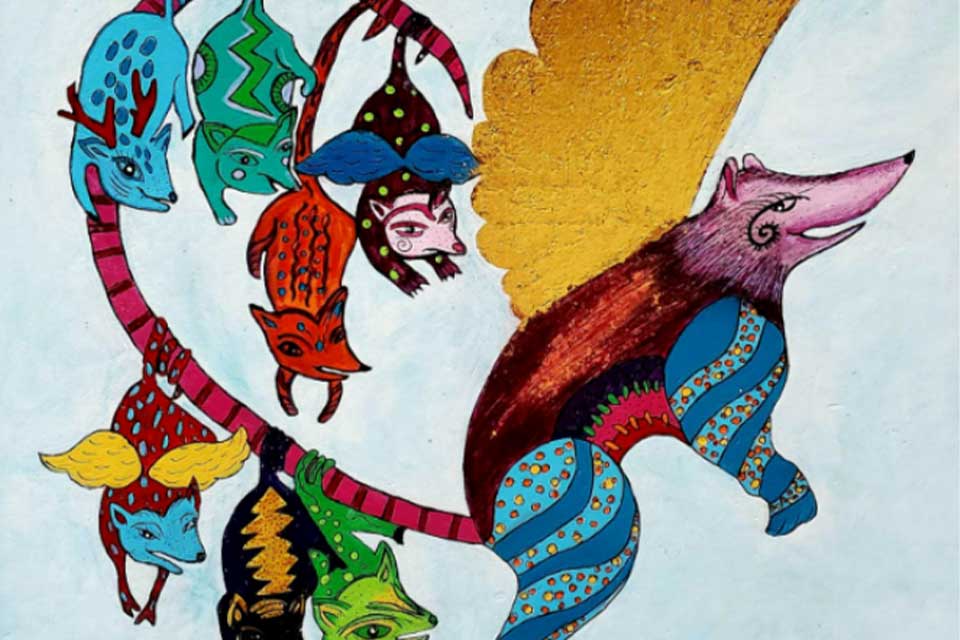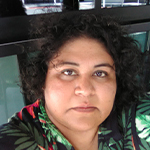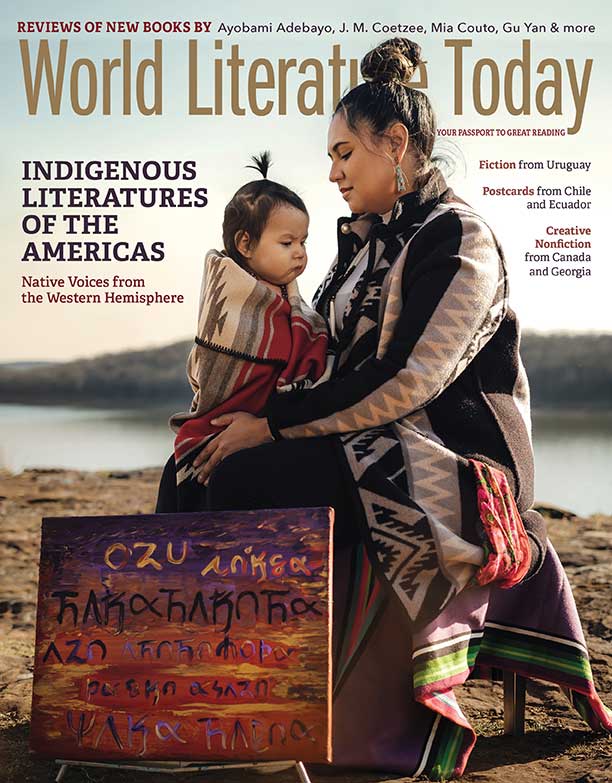With Wings, Hooves, and Horns

After a near-death experience, two beings explore memory, art, and medicine.
The babies have no interest in settling down to sleep. I still need to take care of a few things before I can close my eyes. It’s been a long day. I’m so tired. My feet hurt, my eyes hurt, my head hurts. I’m too old for this. Of all the mothers I know, I’m the oldest with newborns.
They’re growing fast. A little more than half made it this time. I think there were eighteen or twenty of them. I lost a few when they didn’t make it into my pouch. Some of them didn’t eat enough or went to sleep and never woke up again. I think they’re old enough that it’s safe to name them now. To learn the markings of their face and fur, to begin to distinguish their particular cries and yips.
It took three or four litters before I learned it was best to not get attached in the first days. I wept and wept over those tiny dead bundles of flesh and bone as they grew cold and colder. They smelled like mine.
I tell the young mothers what no one told me: you have to make your heart hard to be a mother. There will always be a few that are too weak. A few that won’t eat enough. A few that won’t hold on as hard as they should. A few that will be eaten. And some you’ll see to adulthood and then they’ll be shot or hit by a car or any other number of things.
I tell the young mothers what no one told me: you have to make your heart hard to be a mother.
I don’t know how many litters I have left in me. These might be my last babies. My body’s slowing down. The males are all running after the younger females. I don’t know how much time I have left. After these last ones are gone, it might be time to gather some food and stay in my burrow and just lay my body down. I don’t think I’ll ever want to get up again.
I wasn’t as careful as I should have been. I was tired and it was late. There was no time to run. A bright light blinded me and then my body was hit with so much force that at first I didn’t feel it, I only heard it. A tremendous pulse of sound tearing my flesh away from my bones. I spared a thought to wonder if my babies would survive without me, and then everything went dark.
I didn’t expect to ever wake up again. And if I had, I would have expected to wake up in excruciating pain, my body flung to the side of the road. Alone. Or being picked at by vultures. Not in this unknown place. No trees. No earth. No walls. Only a soft pulsing redness all around me. Streaks of light shooting through it like falling stars. I stretched my paw but the redness offered no resistance, and I saw that there was no paw. I have no body.
And then I realize I’m not alone.
Hello? the voice said, hello? My name is Pedro Linares López. And I made some sound that wasn’t a word. That wasn’t a greeting. I couldn’t tell if what he’d said was humanspeak or animalspeak or which kind of either it was. I only knew that I understood him.
Am I dead? I asked when I could speak. Are we both dead?
I don’t know, he said. I think we might be in purgatory.
I remember the white white lights, I tell him, not asking what purgatory is. I should be hurting. My body should be lying burst open on the road. My skull smashed. If I’m alive, how am I not screaming?
He says he can’t answer any of my questions. He doesn’t know anything. Only that he knew he’d fallen sick. That he’d taken to his bed for days without number. He says he cannot die yet. That his wife and his children are waiting for him to return. What will become of them without him? That his mother’s grief would be terrible to see if he were to die before her.
I wonder if I’m dreaming him? Or if he’s dreaming me dreaming of him?
I realize he is a man before he realizes I am an animal. I don’t think it’s because I’m an animal and he’s a human. I think it’s because I pay more attention. And it takes him even longer to realize what kind of animal I am.
Tlacuache, he said.
A’brix’e, I responded, thinking he wanted my name.
Time becomes meaningless. I’m grateful not to be alone. We sleep sometimes, I think. He always starts awake, calling my name. I wonder how long he was alone when I feel how relieved he is to hear my voice. He tells me about the laughter of his children, about the scent of his wife’s hair. He tells me how he spent his days when he was in the world. Working with paper and cardboard and paste and paint, creating piñatas and Judases. He says it’s what his father taught him. And how much better he thought it was to create what his imagination envisioned than to till in the fields, to slaughter chickens or cows, to construct buildings, to make shoes or loaves of bread. In exchange, I tell him about my babies, about the deep woods, about the vanishing wildernesses.
He tells me about the laughter of his children, about the scent of his wife’s hair.
He tells me about the trees he climbed as a boy, the rivers he swam. We tell each other stories about the moon and the sun and the stars. About fish and insects and the heat of a summer day. We tell each other how we didn’t know it was possible to miss having a body so much. Even our aging and tired bodies.
We are nothing alike. But it feels as if there are parts of us that are interchangeable. He tells me that most humans don’t think animals have souls. I tell him I’d never known humans had souls. But that it makes sense they would. After all, humans are animals.
I’m not sure when it began. He was a scent before he became a shadow. And then his shadow had the weight of a physical presence. We talked as we always did, measuring eternal time with our words. But then our conversations became marked with the moment I first began to see the movements of his hands, the moment his eyes were more than dark impressions, the moment I saw my own fur again, the moment I could again feel the rolling of muscles in my body.
It happened when he was telling me how much he missed working with his hands. That it didn’t matter that most of what he made was either beaten to pieces or set ablaze. I listened to him talk and thought about my work of creating. My life had gone to surviving and eating and rutting and making babies and running and watching the sky and breathing and living. I told him, If I have an art, it’s being.
It happened then. I looked and saw that my gray fur had a tinge of magenta. That my legs were growing impossibly long and that electric-blue stripes were stretching across them. I felt a weight on my back I’d never felt before and a group of unknown muscles. I flexed them and saw bright-yellow feathered wings extend and push against the red pulsing.
He reached out his hands as if to touch me, then paused.
For a second he disappeared, then just as quickly, reappeared.
I think I’m waking up. I saw my home, my wife’s face, the window by my bed. He held out his hands, palms up. My feathers brushed against them.
The humblest creature of the wild, he said. You are the art that wants to become. The medicine that wants to become.
And then I was the one that disappeared. I saw the forest and the road. Flexed my golden wings and rose above the earth. In the next breath I was back in the red pulsing.
Perhaps this is what we are, I told him. Each other’s becoming.
We were solemn as we watched each other disappear.
So much gladness in my heart as I flew toward my burrow and found all my babies still sleeping. And as I lay beside them and they gathered close to suckle, I watched them change, become more themselves. All the colors I’d ever seen and some I’d never seen before emerged on their fur. And as they grew, I watched them all change. Wings emerged. And hooves. And horns.
When they asked what we were, I told them honestly, We are medicine. We are art. We are what will always be becoming.
Austin, Texas











